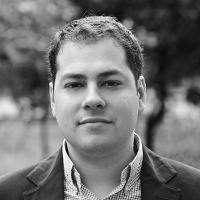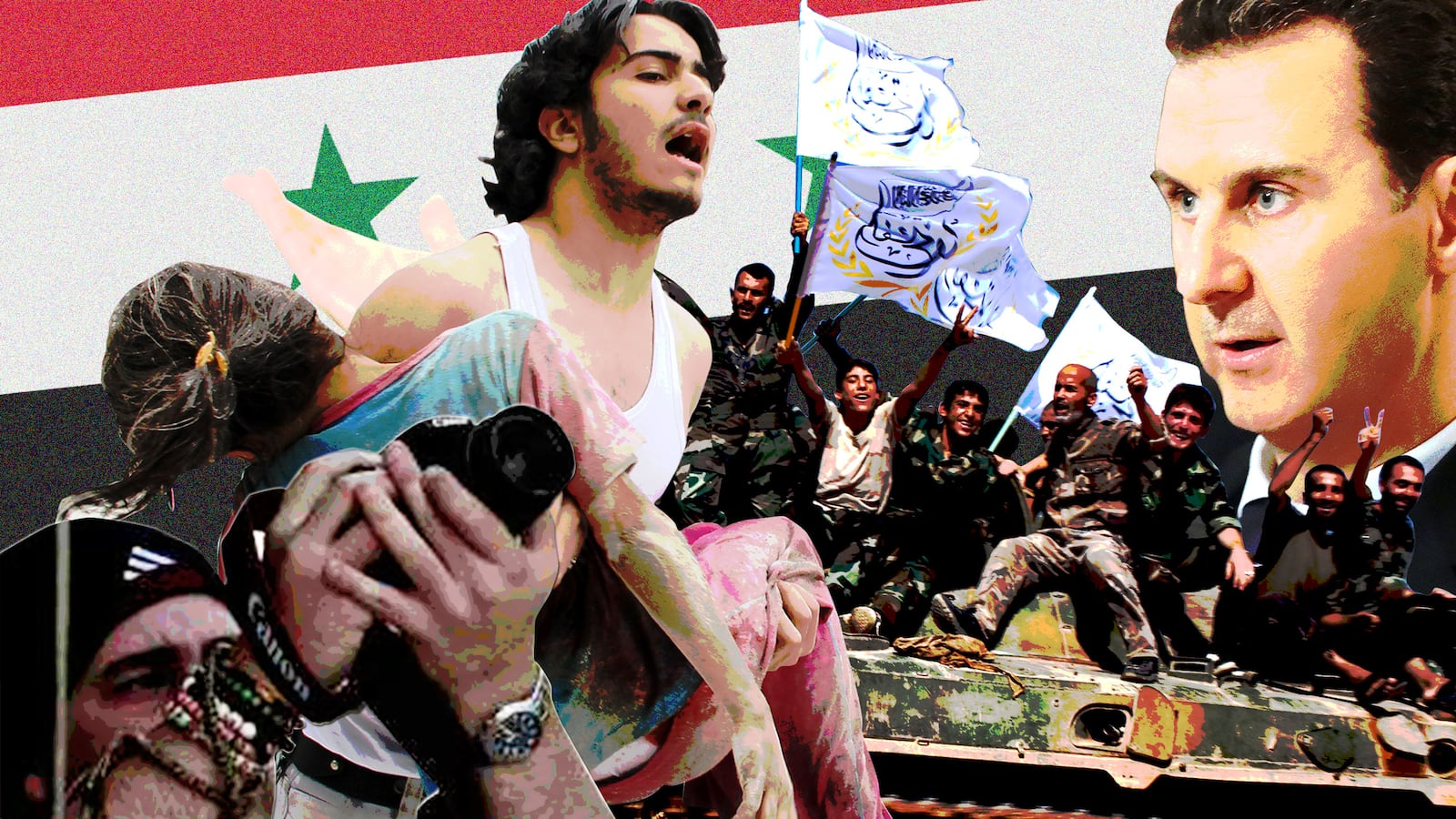MADRID—Eight months ago he regained his freedom, but he hasn’t gained back the 50 pounds he lost in his 10 months as a kidnap victim in Aleppo.
Still, Antonio Pampliega gestures energetically and his eyes sparkle when he talks about journalism. He is a sort of paradoxical paradigm of those who are still willing to risk everything to bring to the world a story that fewer and fewer people want to hear. He knows only too well that death and suffering are not “alternative facts,” and there’s no better way to tell the truth than on the ground from as close to the action as possible.
Pampliega knew his way around in Syria, or thought he did. As a freelancer and working for the French wire service AFP he had been there 12 times before his kidnapping on July 12, 2015, at the hands of the Nusra Front, the al Qaeda franchise in the area.
For better or worse, through hardship and terror, he became an expert on that war. And even with its wounds still fresh in his memory, he went back to the conflict zone over Christmas, this time in Iraq.
***
One of the toughest moments for Pampliega was the kidnapping and murder of his friend, American journalist James Foley, in the summer of 2014.
“Jim was a great guy,” says Pampliega, “a very great person and an exceptional human being. Committed to his profession and to the Syrian people. I remember that he carried out a campaign to raise funds to buy an ambulance and send it to the hospitals of Allepo, which at that time had no way of moving the wounded. This war changed our lives and opened our eyes. We understand that in addition to being journalists we are people…”
Pampliega doesn’t mention his comrades who abandoned the country after that. On the contrary, he says that Foley’s murder only confirmed his own commitment to remain in Syria. “His murder did not change anything,” Pampliega insists. “On the contrary, two days after the news I traveled to Iraq to work there. Our commitment is with the profession but also with the people. We are the eyes of the world and without us we would not know what happens in these places.”
Pampliega has no illusion of immortality, no ice water in his veins. Naturally, his friend’s death affected him. “I’ve considered leaving,” he admits, “but I do not want fear to scar me for life. I’m a journalist, I do not know how to do anything else, and I do not want to do anything else.”
So Pampliega stayed, surviving in the precarious role of a freelancer whom all the media are ready to use but for whom few or none are willing to take responsibility and protect. Forgetting the worst horrors of 2014, Papmpliega crossed the Turkish border aided by Islamist groups to film the scene there for an investigative television program. As they made their way through fields sown with mines, machine-guns lit sky overhead. But he made it to the other side. And he had managed to record it for the program Infiltrados directed by one of the most renowned investigative journalists in Spain, Melchor Miralles. The images left the viewers stunned. The moment seemed historic and unique. And it certainly was. But not for Pampliega. He had been there, done that so many times before, and would go there and do that again.
***
The first time Pampliega entered Syria in December 2011, he learned about the way the Assad regime dealt with information: face the informational silence of Assad. With the help of smugglers he crossed into the Jabl Zawiya area of Idlib, where other reporters had been. The Syrian regime “crushed the villages” that journalists visited “killing hundreds of people,” Pampliega recalls.
Crossing the border of a country at war is like throwing oneself into the void on a bungee cord, but with no certainty that the cord will not break. “The moments before entering illegally to any country are a clash of sensations. Uncertainty. Fear. Tension. An adrenaline kick,” says Pampliega. “These are the ‘good’ things that this profession gives you sometimes, and that help you to feel alive.”
“Often the smugglers ask for too much money and you cannot trust them because they can end up selling you to the highest bidder,” says Pampliega. Terrorist groups put a price on the heads of the war reporters, and although many civilians protected them, others did not hesitate to betray them and sell them for a handful of silver.
The Syria that Pampliega saw on his first visits now no longer exists. “It was totally different from what we know today,” he says. “The Syrians went out into the streets to demand freedom, to demand that Assad—a dictator, let’s not forget it—leave. They wanted to decide. They wanted to live… Five years later I do not recognize Syria or the Syrians. Jihadist groups have hijacked the revolution to make it their own. They have perverted and tainted it. I hope that the madness that has spread in Syria will end and that the Syrians will be free. But I’m afraid this will only make things worse.”
***
On July 12, 2015, neither the protection he thought he’d bought nor the long experience he had served to prevent his kidnapping.
Antonio Pampliega, José Manuel López, Ángel Sastre, were traveling together in a van with a translator who was taken with them but released days later. Their disappearance in Aleppo, in the north of the country, was not known until July 21, when their families and the government of Spain began working tirelessly to try to recover them.
The spies of the Spanish National Intelligence Center (CNI) never completely lost track of them, it seems. The government intercepted hours after their abduction a video of the Spanish hostages put out by the kidnappers, but at the request of the CNI the media in Spain refused to air it.
At the time, I was the director of Neupic, a Spanish organization that acted as an intermediary between journalists and newspapers and television, and I had had the opportunity to work with Pampliega over the previous few months. His stories, usually on video or in photographs, were always shocking, always bringing home the human face of conflict.
The night we learned of his kidnapping I also spoke to the television production team for which he was recording the Syrian war. They are experienced journalists, veterans of a thousand battles. They were not so much worried as they were utterly disconsolate. I later learned that the CNI was convinced that the risk of being killed in the first days of abduction was very high.
For three months, the three journalists kidnapped were together. They practically did not see the sun and spent most of the time in cells. They were not beaten or mistreated. They were fed, but very little, so they lost between 30 and 50 pounds each. With a strenuous effort they were able to organize themselves mentally to dedicate time each day to “sport”: either to walk by the cell, or even to go outside to the patio and to take the air, when that was allowed. In the fourth month came a devastating psychological blow: They received another blow when the kidnappers decided to separate them.
Meanwhile, the Nusra kidnappers sent “proof of life” tokens to the families of Pampliega, Lopez, and Sastre, while constantly moving the victims from one place to another, to try to disorient the CNI. The Spaniards shared their captivity with a pregnant German woman, and with another journalist, the Japanese Yumpei Yasuda.
On one occasion, a few weeks after Christmas 2015, they were transported to the border with Turkey. It seemed his release was imminent. But something went wrong and they were sent back to their cells. There were still four long months before they would tread Spanish soil again.
On May 8, an Air Force Falcon moved them from Turkey to the air base of Torrejón de Ardoz in Madrid, putting an end to ten months of kidnapping.
The moment I talked to him, about half a year after his release, Pampliega was contemplating his return to Syria, for the first time since the kidnapping.
“Why?” I asked, incredulous.
“Because I look at our lives beside the lives of those who are suffering in the war. We owe them the loyalty of reporting on what is happening. We are the eyes of those who cannot see and the voice of those who cannot speak.”
***
All sides in Syria have their hands stained with blood, but, “the regime is directly responsible for the current situation in Syria,” says Pampliega. “Its brutality has managed to radicalize the Syrians until they become worse than the regime itself. But the Syrians do not pose a threat to Europe. None of the attacks in Europe have been committed by Syrian citizens. They already have trouble enough trying to try to survive without worrying about atacking the West. The current situation has made Assad seem ‘the least bad,’ but it is just an erroneous impression. He is a despot who has crushed his people with no restraint.”
Chemical weapons are an example. “The Assad regime used chemical weapons in Ghotta in September 2013,” he says. “Assad has shown that it does not quicken his pulse to kill civilians. He has been doing it since March 2011. He has left more than 300,000 dead on the way. And the use of chemical weapons is just another sign of his proclivity for killing.”
Of course, it is not the regime that takes all the blame for the conflict. The cruelty of jihadists is, unfortunately, well known by the international community, not least because the so-called Islamic State produces relentless, gruesome propaganda.
I ask how did terrorists developed their video marketing plan? How do they turn their executioners and victims into actors? Do they drug the captives to make them play their painful roles, even moments before filming their beheading?
“The Islamic State has turned what started as videos of Bin Laden in a cave in Afghanistan into Hollywood blockbusters,” says Pampliega. “The technical means come from the money that ISIS gets from the sale of oil and other buinesses. Money can but anything… And the protagonists of the videos are not drugged, or at least one doubts they are. Rather you should ask yourself how many times they have been through simulated executions? That’s why they’re so quiet. They re-live the same scene thousands of times and they do not know if it is true or it is a lie. Until in the end they really do kill them.”
Despite his kidnapping, Pampliega has no inclination to support the “least bad” Assad regime.
“I’m still on the same side, I have not changed sides,” he says. “I’m on the side of civilians. Of the Syrians. Neither the regime, nor the rebel groups care about them. They both use them at will. In the end they are in the middle, unprotected and helpless. It is a shameful that it’s said we journalists ‘take sides.’ We must always be on the side of those who suffer the most, on the side where the bombs fall. And I’ll always be on that side. In Syria or wherever… ”.
I insist on asking if there is any hope that the war will have a “happy ending” and he insists on answering “no.”
“No, no, no. There is no happy ending for Syria, nor for the Syrians,” he says.






